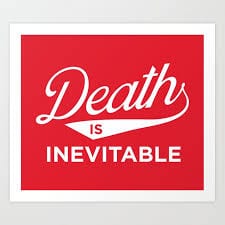I’ve been thinking a lot about end of life issues lately. Really. They seem to be showing up everywhere–on the television show we are currently binge-watching, in my readings in the Psalms, in Montaigne’s Essais that I taught last year, in a lead article in the Atlantic that just came in the mail, in a novel I am rereading that will be the first assignment in my ethics class in the fall. It may also have to do with a significant bike accident that I had a month ago. You know who never talks about end of life issues? Political candidates. Everyone’s clear about their position concerning abortion, but when’s the last time you heard any candidate of any political persuasion talk about death with dignity, physician-assisted dying, or aid-in-dying legislation? I thought so. Never.
After ten years of blogging, I’ve learned to pay attention to issues and ideas that come my way, even when unsolicited, using them as material for my ongoing writing efforts. And it’s not as if end of life issues are unimportant. After all, we all are going to die–as Qohelet reminds us in Ecclsiastes (I wrote about this a couple of Sundays ago).
 Death is not optional. One of my most effective attention-getters in any given class is to point out to a bunch of 18-21 years olds that unless there is a major breakthrough in medical technology in the next few decades, we know one thing to be true with certainty. Within 100 years, everyone in this classroom will be dead. Put the coronavirus pandemic into the mix, and even the healthiest and youngest of us are bumping into our mortality and short shelf life more frequently than usual.
Death is not optional. One of my most effective attention-getters in any given class is to point out to a bunch of 18-21 years olds that unless there is a major breakthrough in medical technology in the next few decades, we know one thing to be true with certainty. Within 100 years, everyone in this classroom will be dead. Put the coronavirus pandemic into the mix, and even the healthiest and youngest of us are bumping into our mortality and short shelf life more frequently than usual.
One of the few remaining vestiges of my Baptist upbringing, one that I will carry with me until I die, is my love of traditional hymns. We sang them with gusto in four parts in my little church, accompanied by my mother on an out-of-tune upright piano. I first learned to appreciate poetry through the lyrics of these old Protestant standards, learning far more about Christian belief and doctrine from their eighteenth and nineteenth century authors than anything I ever heard from the pulpit.
Last Sunday was my second of two Sundays pinch-hitting on the organ at the Episcopal church I attend. Last Sunday was also the day before Independence Day, a Sunday that some folks expect a patriotic music extravaganza at some point. Not when I’m on the organ bench–I hate patriotic music in church with a passion. I did give a nod, however, to God and country by selecting one of my favorites for the processional hymn: “O God, Our Help In Ages Past” by Isaac Watts. It has a great bass line, and it’s a lot of fun to play on the organ. It was also the entrance hymn at the September 14, 2001 National Prayer Service at the National Cathedral in Washington, DC, three days after the 9/11 terrorist attacks. It puts tears in my eyes every time.
The older I get, the more meaningful two of the later verses become:
A thousand ages in thy sight
Are like an evening gone,
Short as the watch that ends the night
Before the rising sun.
Time, like an ever-rolling stream,
Bears all our years away;
They fly forgotten, as a dream
Dies at the opening day.
Watts’ hymn is a setting of Psalm 90, a powerful text in the Jewish scriptures that establishes unflinchingly a truth that most of us would just as soon ignore. We are all going to die. I heard this psalm read beautifully at a philosophy conference I attended a few years ago in Ottawa. It was the annual get-together of the one academic society in which I am very active; one of our long standing and regular members had passed away during the previous year.
The founder and former President of the society, an ordained Presbyterian minister, gave a several minute remembrance/eulogy of our colleague, capped by a powerful reading of Psalm 90. In addition to reminding us of our mortality, the Psalmist develops another inescapable truth: God is God, and you’re not. God is eternal, and you’re not. No punches are pulled. Verses 5 and 6: “You sweep us away like a dream; we fade away suddenly like the grass. In the morning it is green and flourishes; in the evening it is dried up and withered.” Verse 10: “The span of our life is seventy years, perhaps in strength even eighty; yet the sum of them is but labor and sorrow, for they pass away quickly and we are gone.”
True, but certainly not comforting. Jean-Paul Sartre or Albert Camus could have written verse 12: “So teach us to number our days that we may apply our hearts to wisdom.” On a bad day, none of this sounds any better than “Life’s a bitch and then you die.” I am reminded of what an eighty-something Benedictine monk (now in his nineties) told me during a sabbatical semester several years ago as we walked slowly together across the green to noon prayer at the Abbey where he had spent his last six decades and more. “Vance, sabbatical is God’s best idea. And getting old is God’s worst idea.”
My wife, who simply says that “getting old sucks,” would entirely agree. Jeanne and I are in our sixties, mere youngsters in many people’s estimation, I’m sure. But the swift passage of time is difficult to ignore when my sons, 8 and 5 when Jeanne and I first met, are now 43 and 40, when I can’t quite match the times and distances on my daily bike ride that I established five years ago, and when the face looking back at me from the mirror looks more and more like my father’s face did in his later years (he died in his early seventies). Talk about planned obsolescence.
When I introduce the existentialists in various classes, my students often wonder why Sartre, de Beauvoir, Camus, and others are so morbid and obsessed with death. My response is that they are trying to counter our human conviction that we are immortal. Oh, we don’t say that, but we live our lives as if we have all the time in the world, as if we will never die. We “know” that we are short-term creatures, that we have a shockingly short shelf life, but we don’t want to hear about it. As Tolstoy reminds us in The Death of Ivan Ilyich, it’s one thing to intellectually affirm the familiar syllogism that
All men will die.
Socrates is a man.
Therefore, Socrates will die.
It’s another thing entirely to realize what this means:
All men will die.
I am a man.
Therefore, I will die.
Although Isaac Watts’ setting of Psalm 90 asks God to be “our shelter from the stormy blast, and our eternal home,” the psalm itself says nothing about eternal life or bliss in heaven. That’s a New Testament concept. And to be honest, I’m not attracted to the idea that this life is just practice for eternity, even though that often seemed to be the only reason to be a Christian in my youth.
Perhaps I’m too influenced by the existentialists—I want to live my life at least trying to stay conscious of being a short-term creature. And the psalmist provides the proper daily attitude focus, with just a hint of wishful thinking thrown in:
In the morning, fill us with your love.
We shall exult and rejoice all our days.
Give us joy to balance our affliction,
For the years when we knew misfortune.
Show forth your work in your servants,
Let your glory shine on their children.
May the graciousness of the Lord our God be upon us;
Prosper the work of our hands,
Prosper our handiwork.
There’s no guarantee that joy and affliction will balance out at the end of my life. But rejoicing is a verb and a choice, even for a short-term creature.













